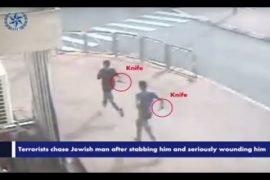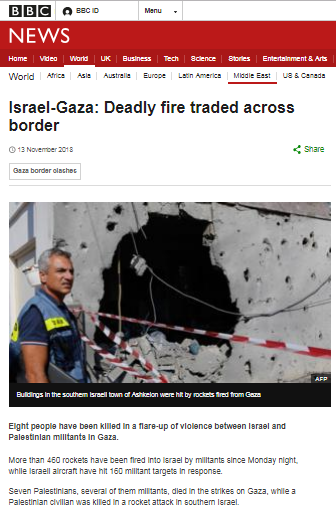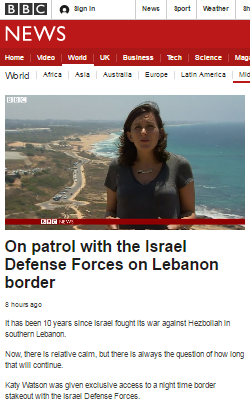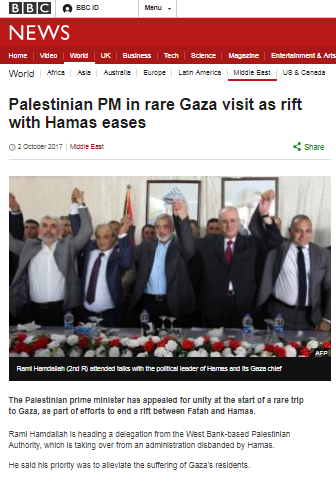In addition to the two parts of the report aired in the May 20th edition of the BBC World Service radio programme ‘Business Matters’ which have already been discussed on these pages (see here and here), the segment included a report (also promoted as a separate clip) from Bethlehem by Marie Keyworth.
The synopsis to the separately promoted clip – titled “Making Ends Meet In The West Bank” – promotes the same inaccurate claim about roads made by Roger Hearing in his introduction to the segment.
“The modern map of the West Bank is a mind-boggling jigsaw of areas under the control of Israel or the Palestinian Authority, as well as settlements and roads linking settlements, that Palestinians cannot use. So how do the 4 million Palestinians in the West Bank do business in such difficult circumstances? Marie Keyworth has been finding out.”
As we noted here earlier, the vast majority of routes are completely open to use by all, with PA registered vehicles excluded from less than 15 kms of roadway in Judea & Samaria.
Making no effort whatsoever to inform listeners that the Palestinian Authority has had total control over Bethlehem for the last nineteen and a half years in accordance with the Oslo Accords, Keyworth opens her report with the following claim:
“Now to many minds the West Bank will conjure up an image of conflict and indeed it has a chequered past. The whole area is under military occupation by Israel and the restrictions that country has imposed on the West Bank are having a huge effect on the economy.”
Keyworth makes no attempt to introduce the all-important context of terrorism past and present and listeners then hear three anonymous voices making the following statements:
“It’s very hard and there’s not a lot of work and people are scared.”
“I can say in one word – it’s miserable because every day we have a struggle. We face the Israelien [sic] law and the Israelien [sic] army.”
“The life here is like…here we are living in a big prison. We just survive for every day. We can’t predict for anything…for like the occupation, the wall, all of these things which surround Bethlehem.”
Notably, the inaccurate claims that the anti-terrorist fence is a “wall” and that it ‘surrounds’ Bethlehem were not edited out. Keyworth continues:
“From the falafel restaurant to the taxi driver, everyone here seems to have a complaint about this occupation.”
She then goes on to interview someone she introduces only as “Sam Bahour – a Palestinian-American businessman”. As readers are no doubt aware, the BBC’s editorial guidelines on impartiality stipulate “the importance of clearly summarising the standpoint of any interviewee where it is relevant and not immediately clear from their position or the title of their organization” but Sam Bahour’s affiliations and political activism get no mention from Keyworth.
Another of Keyworth’s interviewees is an accountant employed by the PA’s education department, identified only as Khaled. Listeners hear him say:
“My last time I got paid in full was in November 2014 and after that we started to have 60% per month.”
Keyworth adds:
“Khaled’s salary was cut because Israel stopped paying the PA the customs tax it collects on its behalf. The move is widely seen as Israel’s punishment for the Palestinians taking their case to the international courts. This money makes up 70% of the PA’s budget so when it’s not transferred, all ninety thousand employees in the West Bank get a pay cut. Now Israel has released some of the money but it’s not the first time this has happened and Khaled expects at some point it’ll all happen again.”
This of course is not the first time the BBC has reported on the topic of tax revenues and yet again the critical context of the PA’s considerable debts to Israel is excluded from the picture. As a recent World Bank report explains:
“Net lending, which mainly represents payments to Israel for electricity, continues to form a major drag on the PA’s budget. In 2014, it was 35 percent higher than the previous year and ran 70 percent above its budget target. The major cause of net lending is that funds collected from consumers through electricity bills are used by Local Government Units to finance expenditures rather than pay bills to the Israeli Electricity Company (IEC) – the main electricity supplier. A share of the unpaid amount is deducted by Israel from the PA’s clearance revenues, and is called net lending. The rest accumulates as debt which, according to IEC, stood at about USD 0.5 billion as of March 2015.”
BBC World Service listeners, however, know nothing of all that: instead Marie Keyworth leads them to believe that Israel is ‘punishing’ the Palestinians.
Keyworth’s account of how some Palestinians became refugees is no less economical with context, erasing completely from view the attacks on the nascent Jewish State by surrounding Arab countries and others: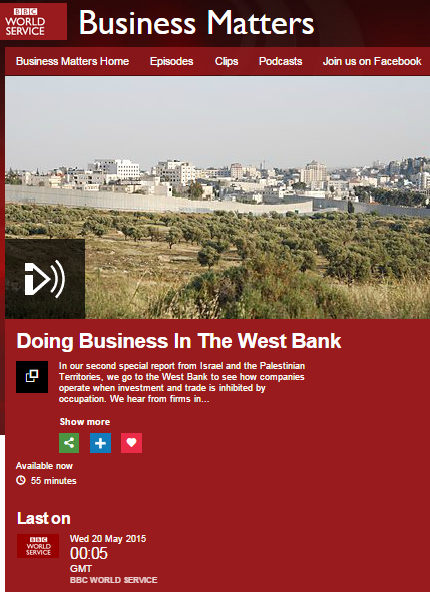
“When the State of Israel was created more than 60 years ago, many Palestinians found their villages fell within the new Israeli boundaries. Those living in the villages south of Jerusalem and Hebron left and moved here to the Dheisheh refugee camp south of Bethlehem.”
Also notable is the fact that in addition to the fact that two interviewees – ‘Mohammed’ and the PA’s Minister of Economy – promote the notion of a link between unemployment and violence (as is also the case in the final section of the segment), Keyworth herself presents the following ‘question’ to the COGAT officer she interviews:
“By increasing security you inevitably constrict the economic freedom of the people in the West Bank, which in turn creates more animosity and more negativity and makes people more angry, which eventually makes the security situation even more serious.”
Like the other sections of this programme, Keyworth’s report conforms to a specific political narrative and has a very obvious agenda. Once more listeners are left with a take-away message which includes only passive Palestinians exempt from any responsibility for their past and present decisions which have affected their lives and their economy.
Whilst that certainly makes for nice, simple story-telling, it does not fulfil the BBC’s public purpose remit of building “a global understanding of international issues” by providing audiences with an objective, impartial, factual and accurate portrayal of the Palestinian economy.
Related Articles:
BBC Business accuracy fail on Gaza tomato exports
Mainstreaming anti-Israel rhetoric on the BBC World Service
BBC WS’s ‘Business Matters’ misrepresents the status of Area C in report on PA economy
BBC World Service’s Hearing reveals the political foundations of a ‘business’ report
Resources:

